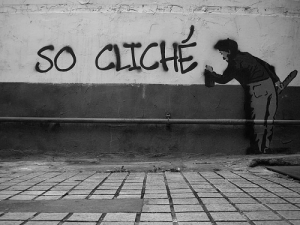In Defense of Clichés

We’ve all seen it before. It’s a brisk, windy day, and a busy businessman headed down the sidewalk has somewhere to be. He grips his briefcase, zips up his jacket, and picks up his pace. In the opposite direction, a similarly-occupied woman with a parasol pulls her scarf closer around her neck and holds her umbrella tight as the gusts continue. Both in a hurry, they dash down the walkway until SMACK! They collide, the man’s briefcase spills its contents all over the ground, and the woman’s parasol soars off into the breeze. Initially annoyed, the duo quickly realize they may have found more than they lost—in fact, they’ve found nothing short of true love!
How predictable, how derivative, how cliché.
However, clichés, or sayings or elements that are considered overused, aren’t always the scourge of every good story. While we can all agree that a story riddled with clichés can easily lose the dramatic weight it intended to carry, these common, easily recognizable elements of a given genre can supplement a brilliant, original story.
Using clichés early in a work can develop a viewer’s expectations of what is to come, leaving them vulnerable to an unexpected twist! Occasionally, the presence of several clichés early in a film even serves to warn viewers that the “answer” to the plot isn’t as simple as it may seem—mystery films often use clichés in this manner. For example, a screenwriter may take advantage of the common “butler killed them” trope by having a housekeeper as a prime suspect very early in the film, primarily to indicate to the audience that such a conclusion is likely false and that the mystery is not as simple to solve as they may expect.
Clichés can also form the backbone of a comedic work, one which deconstructs the common tropes of its genre to hilarious effect. The Sharknado franchise is famous for this, making endlessly more absurd takes on the disaster genre and parodying every common aspect of it. Without the universality that clichés carry, these comedies would lack their relatable punch. This reliability can also take a more serious form: so-called “spiritual successors” are works that incorporate elements of another work, often elements that are in fact clichés, in order to emulate the feelings the original conveyed.
Applications in other works aside, clichés deserve a degree of respect simply because of where they come from—they all start as an idea that resonated across a genre. So many villains may be the fathers, brothers, and mothers of the hero, but all of them may remind us of the classic cinema shocker that was Darth Vader’s “I am your father” reveal. Sometimes a particularly brilliant piece will fit several narrative puzzles, and that’s the wonderful thing about stories and genres. Pablo Picasso said that “the bad artists imitate, the good artists steal.” A bad work of media is one which derives its entire identity from a different work, but a good work is one which “steals” the best moments, or clichés, to serve its own purpose. So next time you see an agent defuse a bomb at 00:01, or watch a dying man use his final ounce of strength to declare his love, take a moment and remember all the good that clichés have done for the creative world. Your happy ending might just rely on it.

